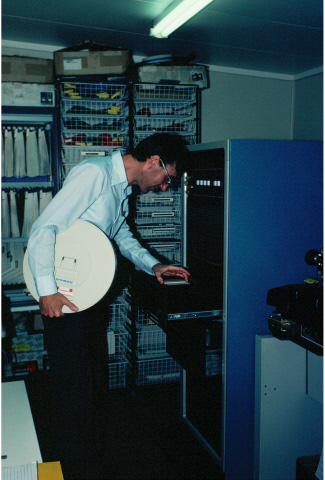Sometime during the voyage out to Australia in 1965 and under circumstances I have long forgotten, I had made friends with a young German who had come out to Australia many years before with his parents as a child. He was now married and on his way back from a trip to Europe with his wife, baby, and mother-in-law with whom he had revisited his own hometown and that of his Yugoslav wife. This friendship was going to have a major impact on my future life in Australia - more of this momentarily - and to this day Hans and I have remained good friends.
Hans and his family disembarked in Sydney to travel back to their home in Canberra whereas I, with most other assisted migrants, continued to the Port of Melbourne from where we were transported to the government's Migrant Centre at Bonegilla which was a camp along the lines of what you saw in the movie "The Great Escape" - except that Bonegilla was a darn sight worse.
Just like in that movie, I made my escape on the third day to begin my first job in Australia as 'Trainee Manager' with Coles & Company which had foodstores all over Melbourne. There I was, refilling shelves with groceries whose names I did not know, and had I known them would not have been able to pronounce, and helping blue-rinsed ladies take their boxes full of shopping out to their little Austin cars.
During the first days in Melbourne I had written to Hans in Canberra to let him know where I was, and before long he was on the 'phone to me suggesting that I might want to come up to Canberra. I didn't need much persuading! Hans got me a job as storeman/driver in the hardware & plumbing supplies company of Ingram & Sons in Canberra's industrial suburb of Fyshwick. I drove an INTERNATIONAL truck and delivered anything from ceramic floor tiles to bathtubs and roofing iron to building sites all over Canberra.
Not that I had a driver's license for a truck or had ever driven a truck before in my life but this was Australia, a young and vigorous country still largely devoid of formalities, and an even younger city, Canberra, still in the making: Hans simply took me down to the local Police Station where everybody seemed very impressed with my elaborate German "Führerschein" and where I was promptly issued with a much simpler but oh so much more useful Australian driving license.
I kept at this job for a few months but after I had almost burnt out the truck's diff at Deakin High School while bogged down in the mud with a full load on the back, and a slight but still embarrassing collision with the rear-end of another vehicle just outside the British High Commission, I thought it best to cash in my chips while I was still ahead.
I had earlier on answered an advertisement by the Australia & New Zealand Bank inviting school-leavers to join their ranks and, to my own surprise and joy - and very much thanks to the Bank's manager, Mr Robert Reid, to whom I shall be eternally grateful - I was accepted. I joined the ANZ Bank and, in keeping with my new "status" as a "Bank Johnny", moved from the migrant hostel on Capital Hill (now the site of the new Parliament House) into Barton House, one of Canberra's many boarding houses in those early years.
Working for the ANZ Bank allowed me to not only learn good, almost expletive-free English and mix with people a cut above the rest but it also introduced me to Australian commercial practices which would stand me in good stead as I worked my way through a correspondence course in accountancy with the then Hemingway Robertson Institute.
Two years later, I was well on my way to becoming an accountant and, having completed the obligatory two years in Australia, also on my way back to Germany. Even though I felt quite at home in Australia and no longer thought "they're a weird mob", I wanted to take one last look at the "Vaterland" to confirm in my own mind that the decision to emigrate, made so hastily and so much on the spur of the moment two years earlier, was the best thing I had ever done in my life.
Some six years after first arriving in Australia, on the 9th of December 1971, I appeared before Reserve Magistrate David Bruce Moorhouse at Arawa on Bougainville Island in the then Territory of Papua New Guinea, to swear allegiance to Her Majesty Queen Elizabeth the Second, her heirs and successors, and to observe faithfully the laws of Australia and fulfil my duties as an Australian citizen.
At last I'd become one of them! No, not one of them but them: the weird mob! ☺




























